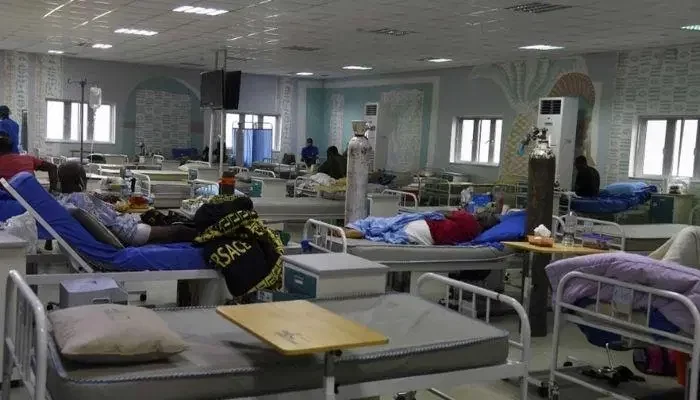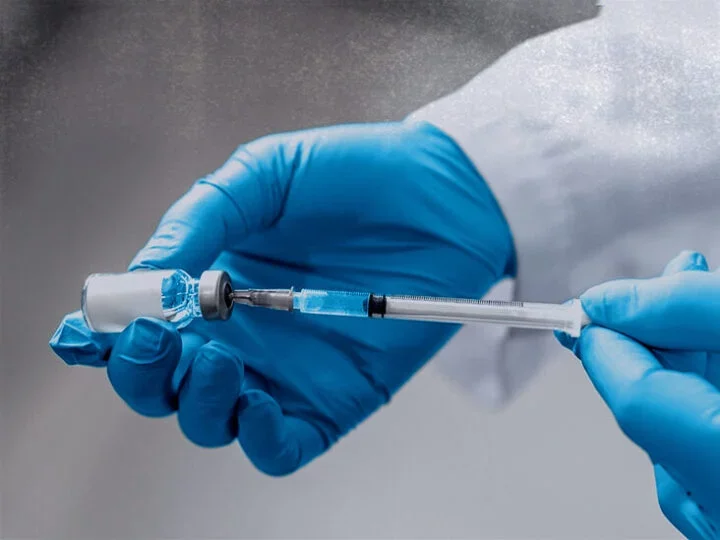
Nigeria is facing a critical shortage of skilled health professionals. Public hospitals are grappling with significant challenges that affect their ability to deliver quality healthcare. The strain is evident across the country, from insufficient bed spaces to outdated equipment and inadequate staffing.
The depletion of the workforce is a direct consequence of the mass exodus of doctors, nurses, pharmacists, midwives, lab scientists, and other cadres of healthcare workers for greener pastures, aka Japa phenomenon. It has created significant gaps in the already fragile system.
Public hospitals that used to be places of hope now resound with echoes of despair. Patients bear the brunt of facing long wait times or being referred to other under-resourced clinics. Critical cases requiring immediate attention get delayed as patients are shuffled between facilities trying to source a bed, often leading to tragic outcomes. Coupled with the perennial systemic inefficiencies such as lack of bed space, shortage of specialists, lack of water and electricity, scarce resources and out-of-pocket payments, all conspire to present a healthcare system that is in crisis.
Japa takes hold
Doctors face numerous challenges, prompting their exodus. Among these are comparatively lower pay, poor working conditions, and insecurity. Better salaries and improved working conditions abroad are strong pull factors enticing many to seek opportunities elsewhere. With a substantial number of doctors leaving, the bulk of hospitals are experiencing increased patient wait times and a noticeable decline in the quality of care.
The brain drain has created a drought of medical professionals. The alarming trend threatens the country's ability to provide equitable healthcare. Between 2019 and 2024, not less than 16,000 doctors have gone abroad for better opportunities even as around 17,000 have changed jobs within the country. Nigeria has about 300,000 health professionals, including nurses, midwives, pharmacists, and lab scientists. As of 2024, there were approximately 85,000 to 90,000 registered doctors in the country.
Workforce challenge
Under-staffing has reached alarming levels in many hospitals.
The World Health Organisation (WHO) recommends a doctor-to-patient ratio of 1:600, but in Nigeria, it averages over 2,000 patients for every doctor. This shortage forces doctors to work almost permanently beyond normal hours. Worse still, Nigeria's nurse-to-patient ratio averages 1:1,160, far below the global standard of 1:5. WHO recommends a nurse-to-patient ratio of 1:4 in general wards, but many public facilities are reporting ratios often two to three times higher leading to an excessive workload that compromises patient care.
The patient-to-hospital ratio in Nigeria is also glaringly high, leading to overcrowded wards, clinics, and waiting areas. Most federal and state hospitals are receiving far more patients than they were designed to accommodate, creating chaotic environments and frustrating access to care. In the urban centres, it's not uncommon to see patients waiting hours, or even days, to access basic medical care.
Patients' testimonials
Yetunde Adebayo, a widow from Lagos, recounted her harrowing experience.
"About a year ago, my husband suffered a stroke around midnight, we rushed him to the nearest public hospital, which is a tertiary facility, but the Accident and Emergency Ward was full. We took him to another public hospital, it was the same story - there were no beds available.
"When we arrived at the third hospital, there was blackout, we gathered the generators had failed, leaving the facility in darkness. A doctor and nurse came out to check him in the car park. There were also no beds, so we were told to wait while they created space for him in the ward. However, the beds were occupied by very sick patients who could not be discharged immediately. We waited and waited, watching him deteriorate till he passed on."
Janet, a 42-year-old mother of four waited on the queue for six weeks for a hernia surgery. "When I reported at the government hospital in Abeokuta, the doctors told me that they didn't have the required surgical tools. I was told to return back the following week, but the surgery was again rescheduled and it wasn't until another couple of weeks before the procedure was done. The delays worsened my condition, leaving me in pain and frustration. I have vowed never to go back to that hospital."
Hygiene and sanitation standards in hospitals are often nothing to write home about as a result of poor maintenance that can jeopardize patient safety. This was what Shade discovered after she went to a general hospital in Lagos for a routine procedure.
"The wards were unclean, and the toilets were unsanitary, there was no water and as careful as I was, I developed an infection afterward. This added to my stress even when I was already having a difficult time," she lamented.
Another complaint was shortage of crucial medical supplies and medications. "From basic painkillers to essential treatments for serious conditions, items are often out of stock, delaying surgeries and critical care, and leaving patients without necessary treatments and in worse health."
Investigation
An independent evaluation of 20 tertiary hospitals conducted by the National Tertiary Health Institutions Standards Committee (NTHISC) revealed major problems in healthcare services at 20 hospitals across the country. The NTHISC was established by the Federal Government to maintain tertiary hospital standards through issuance of Certificate of Standards and penalties on substandard hospitals that may include closure and criminal prosecution of indicted officials.
Among key issues unearthed include poor infrastructure, lack of essential medical equipment, staffing shortages, inadequate funding, and overall service quality below global standards. The NTHISC found significant infrastructure issues, including outdated buildings, broken equipment, limited space for patients, and inadequate maintenance. There was a noticeable shortage of qualified medical staff, particularly specialists and nurses. It was established that service delivery is hampered by delays in treatment, inadequate patient care, poor communication, and failure to follow clinical guidelines.
Insufficient government funding and weak management practices within hospitals were highlighted. To address these problems, the NTHISC recommended stricter standards, increased funding, training programmes for healthcare professionals, and improved monitoring and accountability. The Coordinating Minister of Health and Social Welfare, Prof Ali Pate, noted that improving care quality is now a priority even as he stressed that the committee's findings will aid in creating scorecards to pinpoint areas needing improvement.
Overcrowding vs under-staffing
Overcrowding and under-staffing persist. The patient-to-hospital ratio is glaringly high, contrasting with the low doctor-to-patient-ratio. Patients fill the waiting rooms, the outpatient wards are full, and the in-patient wards are overflowing as the staff struggle to attend to everyone. Most federal and state hospitals are designed to accommodate fewer patients than they currently receive, creating chaotic environments and frustrating access to care.
In some urban facilities, it's not uncommon to see patients waiting for hours, or even days, to access basic medical care. Patients commonly report hours spent waiting to see a doctor and even after coping with long queues, many leave in frustration without receiving treatment.
Beyond the longer wait times for outpatient cases, overcrowding also takes a toll on emergency response. Emergency units, often the first point of contact for critical cases, are often overwhelmed with patients. With limited bed spaces and overburdened staff, these departments are unable to function optimally, which can lead to prolonged trauma and even preventable death.
Bed space challenge persists
Hospital bed capacity is a vital component of healthcare delivery, but in Nigeria, it remains a bottleneck. The gap between the number of available beds and the demand for healthcare has created numerous challenges.
There is a wide gap between available hospital beds and the number of patients needing urgent care and admission. Nigeria currently has less than one hospital bed for every 1,000 people, far lower than the global average of 2.3 beds per 1,000 people. There are long waits at specialist clinics, and many hospitals routinely turn away patients because they do not have enough beds.
Long queues & specialist shortages
At the root of the problem is chronic under-funding. Government funding often falls short of the needs of these hospitals leading to inadequate maintenance of facilities, outdated equipment, and shortages of essential supplies. Front-line federal and state teaching hospitals are bearing the brunt, even the specialty health facilities are not spared.
Having to work with tight budgets, many of these hospitals are not in optimal shape, facing poor sanitation, unreliable electricity, and outdated equipment, limited access to modern medical technology, making it difficult to provide top-notch care. In several instances, regular equipment maintenance is ignored, leading to frequent breakdowns and service disruptions. Non-accountability and inefficiency slow down the delivery of healthcare services.
Budgetary allocation deficits
Vanguard findings reveal that there is a disparity in healthcare infrastructure from state to state even as support for tertiary and specialty hospitals from state governments is uneven. While wealthier states tend to operate comparatively improved facilities, several federal hospitals struggle with paucity of resources. Some states invest heavily in their facilities, others provide little or no assistance. Some state governments focus on primary healthcare but overlook the specialty hospitals.
Although the Federal Ministry of Health and the Budget Office of the Federation have allocated varying amounts to the health sector over the years, the sector has been serially underfunded, resulting in a significant deficit with over 70 per cent of health expenditure coming from out-of-pocket expenses.
The 2025 Health budget of N2.48 trillion (5.18 per cent of the total budget) though higher than the 2024 Health budget of N1.23 trillion (5.15 per cent of the total budget) is not enough to meet the 15 per cent target set by the 2001 Abuja Declaration, leaving a funding deficit greater than the funds allocated to the sector.
FG addressing health sector problem - Dr Salako
In a response, the Minister of State for Health and Social Welfare, Dr. Iziaq Salako said the Federal Government is already addressing most of the problems faced by the tertiary and specialist hospitals in the country.
This, he assured, is being expected through increased budget allocations to the Health sector to support infrastructure development, and establishing eight new Federal Medical Centres and teaching hospitals across the country. The expansions, he noted, will alleviate pressure on existing facilities and provide more bed spaces for patients.
Experts speak
But experts say that even though Nigeria has a commendably comprehensive National Health Policy which recognises that primary health care is the key to attaining the goal of health for all the people, serious shortcomings in the public health care services must be tackled.
They called for increased healthcare funding by raising the healthcare budget to at least 15 per cent of the national budget, arguing that innovative funding models can supplement government allocations, leading to improved facilities and services.
FG should privatise Specialist Hospitals for greater efficiency - Dr Faduola
The Chief Scientific Director, Founder/CEO of Androcare Fertility Centre, Lagos, Dr Paul Faduola, said the government is not running the health industry as a business, even as he argues that the private sector should be opened up to drive the specialist hospitals.
"What the government can do is to bring down the tariffs and that will crash prices in the hospitals, that is the advantage India has. The government opened the private sector and allowed it to drive specialist treatments, but the government also ensures that the tax is low. So now if you want to do say a kidney transplant in India, and you compare to the cost in the USA, it is much cheaper in India, and that is why you will see more Nigerians going to India than to the US. So the government can intervene by bringing the price of consumables down and things will improve to create the enabling environment for the private sector.
"In India, the government concentrates on primary health care for the masses. What drives medical care to India are the private hospitals that are responsible for those specialised treatments like cancer care, and kidney transplant. The Nigerian government can invest in insurance and similar programmes to support the people but should concentrate on the military hospitals, police hospitals and stuff like that and pay less attention to the teaching hospitals.
"In Nigeria, there is little or no culture of quality management system in governance, and that is why the teaching hospitals are inefficient. Even though the government is pumping money into them, that money is being wasted because of non-accountability.
Hospitals should operate as a business
"The government hospitals are not seen as a business. If you just try and book an appointment for oncology or neurosurgery for instance in any of the teaching hospitals, you may be given a six-month to a one-year appointment waiting time. Somebody that could be dead in the next one month is being given a six-month to a one year appointment, no one wants that.
This only happens because the government does not see the service as a business, rather, it is considered more like rendering free service and so there is no investment in their technology or personnel, no investment in anything. You may have the name teaching hospital, but nothing is going on there.
"Now, if the government will sell these teaching hospitals or privatise them and we make them like the Mayo Hospital, or the Cleveland Clinic in the US, or the Fortis Clinic in India, and let them be privately driven, what you will notice is that there will be more specialist doctors in those hospitals, and they will become more efficient."
On Japa, he advocated better welfare and conditions for health workers. "If you come to my clinic, for instance, I have had doctors working with me for five years and I have not heard that any of them wants to japa. The truth is that when you pay professionals peanuts, they will want to go to greener pastures. You should pay people according to their contribution, that is how the private sector is doing it. When professionals are being paid according to their contribution, nobody is going to run away, there won't be any case of japa and the hospital will have money to run as a business.
Healthcare must be universally available, more centres of excellence established - Asiru
On his part, the President of the Academy of Medical Sciences, Prof. Oladapo Ashiru admonishes the government to acknowledge that medical services require different strategies to address the various healthcare levels.
Ashiru, who is also the Chairman & Chief Medical Director, Medical ART Centre, Lagos, wants the Nigerian government to review medical expenditure, such as the $366 million allocated in 2023 compared to $465 million in 2024, to determine which specialties are being focused on.
"The first level of healthcare must be universally accessible to everyone, with each local government ensuring that primary healthcare is readily available, ideally within walking distance for residents. Following primary healthcare, the next stage is secondary healthcare, akin to moving from primary to secondary education. This involves the general hospitals that are providing advanced services like surgeries. Establishing effective secondary healthcare relies on the universities to support the system. Tertiary healthcare is essential, especially teaching hospitals that handle more complex cases.
"We must establish centres of excellence within this framework. These centres play a critical role in improving healthcare quality. However, their impact may not match that of the teaching hospitals. Examples include specialised centres for renal transplants, eye surgery, hip replacements, and cardiac care. The government must consider developing these centres state by state."
On the shortage of specialists, Ashiru remarked: "In 2025-2026, the government needs to identify key areas like cardiology and assess the availability of cardiologists in hospitals across various regions, such as Lagos, Enugu, and Abuja. If there are insufficient specialists, the government must address this gap."
Emergency care is undermined- Consultant
A clinical consultant at the Lagos University Teaching Hospital, LASUTH, who pleaded anonymity explained that overcrowding doesn't just mean longer wait times for outpatient cases. "When emergencies compete with routine cases for resources, it becomes harder to allocate beds, diagnostic tools, or even life-saving medications promptly. Emergency units are usually the first point of contact for critical cases, and when they are overwhelmed with patients, and with limited bed spaces and overburdened staff, these departments are unable to function optimally, which can lead to preventable deaths," she explained.
More government investment needed- Dr Jeremiah Obi
Dr.Jeremiah Obi, a young neurosurgeon who recently relocated to the UK, reflects the thoughts of many in his field. He expressed frustration, saying the system is failing. "Despite working hard, we face extreme pressure without enough resources. Many professionals leave because of these issues. Why work in such conditions when better options are available elsewhere?
"Japa, coupled with the crumbling infrastructure and non-affordable healthcare, paint a grim picture of the healthcare system. It is a system in crisis, one that demands urgent and decisive action. Increased government funding, improved infrastructure, competitive salaries for healthcare professionals, and a robust and accessible healthcare insurance scheme are crucial steps towards restoring hope and ensuring quality healthcare for all Nigerians," Obi remarked.
















Comments